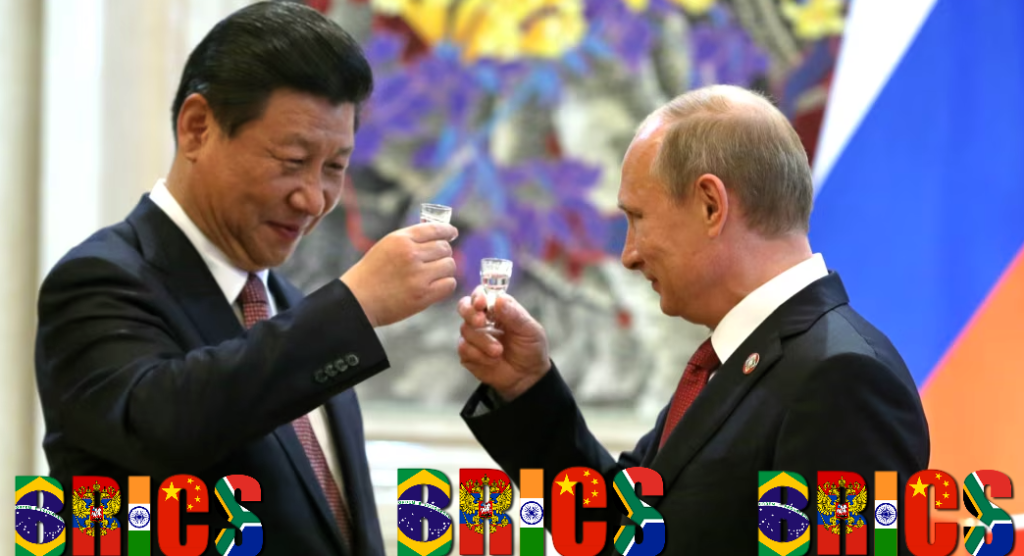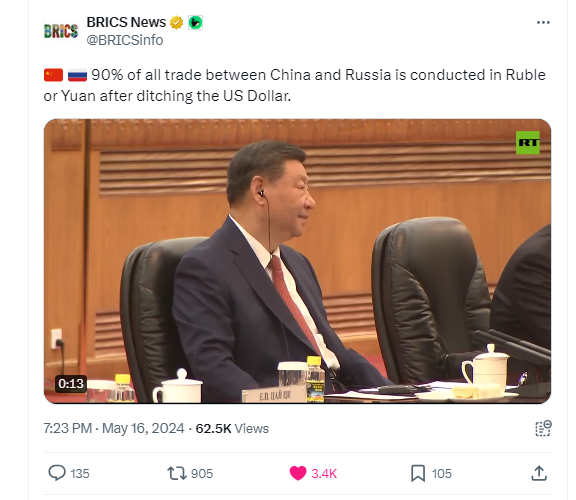BRICS Shakes the World: Putin Declares Victory Over the Dollar! (video)
Ready to uncover the truth? Sick of the lies? Join our Telegram Channel now. It’s time for the real story! My gratitude to all my readers!
Russia and China have transformed global trade by ditching the US dollar for rubles and yuan, a seismic shift challenging dollar hegemony and empowering the BRICS nations.
Russian President Vladimir Putin revealed that Russia and China have largely abandoned the U.S. dollar for their bilateral trade. Instead, they are now conducting 90% of their trade transactions in rubles or yuan. This bold move is not just a shift in monetary policy but a strategic attack on the longstanding dominance of the U.S. dollar, marking a significant victory for the BRICS alliance.
The Fall of the Dollar’s Hegemony
For decades, the U.S. dollar has reigned supreme as the world’s primary reserve currency, underpinning global trade and finance. Its dominance has granted the United States unparalleled economic influence and geopolitical power. However, the recent developments orchestrated by BRICS, a coalition comprising Brazil, Russia, India, China, and South Africa, threaten to upend this status quo.
The Implications of Ditching the Dollar
The transition to ruble and yuan for Sino-Russian trade is more than a mere monetary adjustment. It represents a deliberate effort to weaken the dollar’s stranglehold on global commerce. By circumventing the dollar, Russia and China are shielding themselves from the reach of U.S. sanctions and asserting greater economic sovereignty. This move is poised to have far-reaching consequences, reshaping international trade dynamics and reducing the influence of the U.S. financial system.
A Strategic Masterstroke by BRICS
The shift away from the dollar is a strategic masterstroke by BRICS, highlighting the bloc’s collective ambition to forge a multipolar world order. As these nations continue to strengthen their economic and political ties, their collaborative efforts to diminish the dollar’s dominance are becoming increasingly evident. This is not just a blow to the U.S. dollar but a direct challenge to the Western-dominated global financial architecture.
WARNING: The Vatican Demanded this Be Kept Under Lock and Key: “The Divine Prayer – One Minute Prayer From Biblical Times”
The Rise of BRICS: A New Economic Order
BRICS has long been an advocate for a more equitable and balanced global economic system. The bloc’s recent actions underscore its commitment to this vision, signaling a potential realignment of global power structures. The de-dollarization of Sino-Russian trade is a critical step in this process, paving the way for other BRICS nations to follow suit.
The Ripple Effect on Global Markets
The impact of BRICS’ de-dollarization efforts extends beyond Russia and China. As more countries consider diversifying their reserves and reducing their reliance on the dollar, the demand for alternative currencies like the ruble and yuan is likely to increase. This could lead to significant shifts in global currency markets, with potential implications for exchange rates, trade balances, and investment flows.
Strengthening Economic Resilience
By reducing their dependence on the dollar, BRICS nations are also enhancing their economic resilience. This move mitigates the risk of economic coercion by the U.S. and provides these countries with greater autonomy in their financial and trade policies. It is a bold assertion of their sovereignty and a testament to their growing confidence on the global stage.
The U.S. Dollar’s Waning Influence
While the immediate effects of this shift may not be readily apparent, the long-term implications for the U.S. dollar are profound. The dollar’s preeminence has been a cornerstone of American economic power, enabling the U.S. to influence global markets and exert pressure on other nations. As the dollar’s dominance wanes, so too does the leverage it affords the United States.
A Slow but Steady Decline
The decline of the dollar’s hegemony is likely to be a gradual process. However, the actions of BRICS signal the beginning of this decline. As more countries explore alternatives to the dollar, its role as the world’s primary reserve currency could be further eroded. This shift has the potential to reshape the global financial landscape, reducing the U.S.’s ability to unilaterally impose its economic will.
Challenges Ahead for the U.S.
The U.S. now faces the daunting task of navigating a world where its currency no longer holds unrivaled sway. This new reality will require significant adjustments in American economic and foreign policy. The U.S. must find ways to maintain its influence and adapt to the evolving dynamics of global trade and finance.
The Long-Term Impact on Global Trade
The de-dollarization of Sino-Russian trade is just the beginning. As this trend gains momentum, the global trade landscape is set to undergo a profound transformation. The dominance of the U.S. dollar in international transactions has long been a stabilizing force, but its decline could introduce new complexities and uncertainties.
Diversification of Currencies in Trade
One of the most immediate effects of de-dollarization is the diversification of currencies used in global trade. This shift could reduce the transaction costs associated with currency conversions and lower the risk of exchange rate volatility. However, it also requires countries to develop new financial infrastructures and mechanisms to support these alternative currencies.
Strengthening Regional Alliances
The move away from the dollar is also likely to strengthen regional alliances. BRICS, in particular, stands to benefit from closer economic cooperation and integration. By reducing their reliance on Western financial systems, these countries can build more resilient and autonomous regional economies, fostering greater stability and growth.
The Geopolitical Ramifications
The de-dollarization of trade between Russia and China is not just an economic maneuver but a geopolitical statement. It reflects the broader strategic ambitions of BRICS and its desire to challenge the existing world order. This shift has significant geopolitical ramifications, potentially altering the balance of power in global politics.
Reducing U.S. Influence
The U.S. has long used its economic power to influence global politics. The dollar’s dominance has been a key tool in this regard, allowing the U.S. to impose sanctions and exert pressure on other nations. As the dollar’s influence wanes, the effectiveness of these tools diminishes, reducing the U.S.’s ability to shape international events.
Empowering Emerging Economies
The de-dollarization movement empowers emerging economies by giving them greater control over their economic destinies. BRICS nations, in particular, stand to benefit from this shift, as it enhances their ability to pursue independent policies and protect their interests. This newfound autonomy is likely to embolden these countries and increase their influence on the global stage.
The Path Forward: Opportunities and Challenges
The transition away from the dollar presents both opportunities and challenges for BRICS and the broader international community. While this move promises greater economic sovereignty and resilience, it also requires careful management to ensure stability and minimize disruption.
Building New Financial Infrastructures
To support the de-dollarization process, BRICS nations must develop robust financial infrastructures capable of handling increased volumes of trade in alternative currencies. This includes establishing new payment systems, clearinghouses, and financial instruments that facilitate seamless transactions in rubles, yuan, and other currencies.
Navigating Economic Risks
The shift away from the dollar introduces new economic risks, including exchange rate volatility and potential market fragmentation. BRICS nations must work collaboratively to mitigate these risks and ensure a smooth transition. This may involve coordinating monetary policies, stabilizing exchange rates, and fostering greater financial integration.
Seizing Strategic Opportunities
Despite the challenges, the de-dollarization movement presents significant strategic opportunities for BRICS. By reducing their dependence on the dollar, these countries can enhance their economic resilience, protect themselves from external pressures, and pursue more independent and dynamic growth strategies. This shift also positions BRICS as a formidable counterweight to Western economic dominance, promoting a more balanced and multipolar global order.
Conclusion: A Bold New Era for Global Finance
The decision by Russia and China to conduct 90% of their trade in rubles and yuan is a landmark moment in the ongoing de-dollarization movement. This bold step underscores the determination of BRICS nations to challenge the dominance of the U.S. dollar and reshape the global financial landscape. While the immediate impact of this shift may not be fully realized, its long-term implications are profound, heralding a new era of economic sovereignty and geopolitical realignment.
As BRICS continues to assert its influence and promote a more equitable global order, the world is witnessing the dawn of a new economic paradigm. The de-dollarization of trade between Russia and China is just the beginning, setting the stage for a more diverse and resilient international financial system. In this brave new world, the hegemony of the U.S. dollar may be a relic of the past, replaced by a dynamic and multipolar future where nations wield greater control over their economic destinies.













